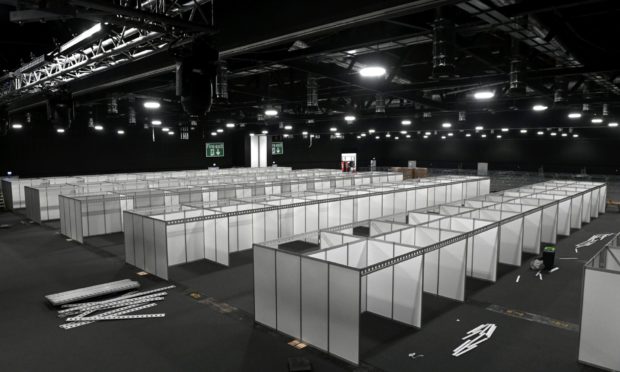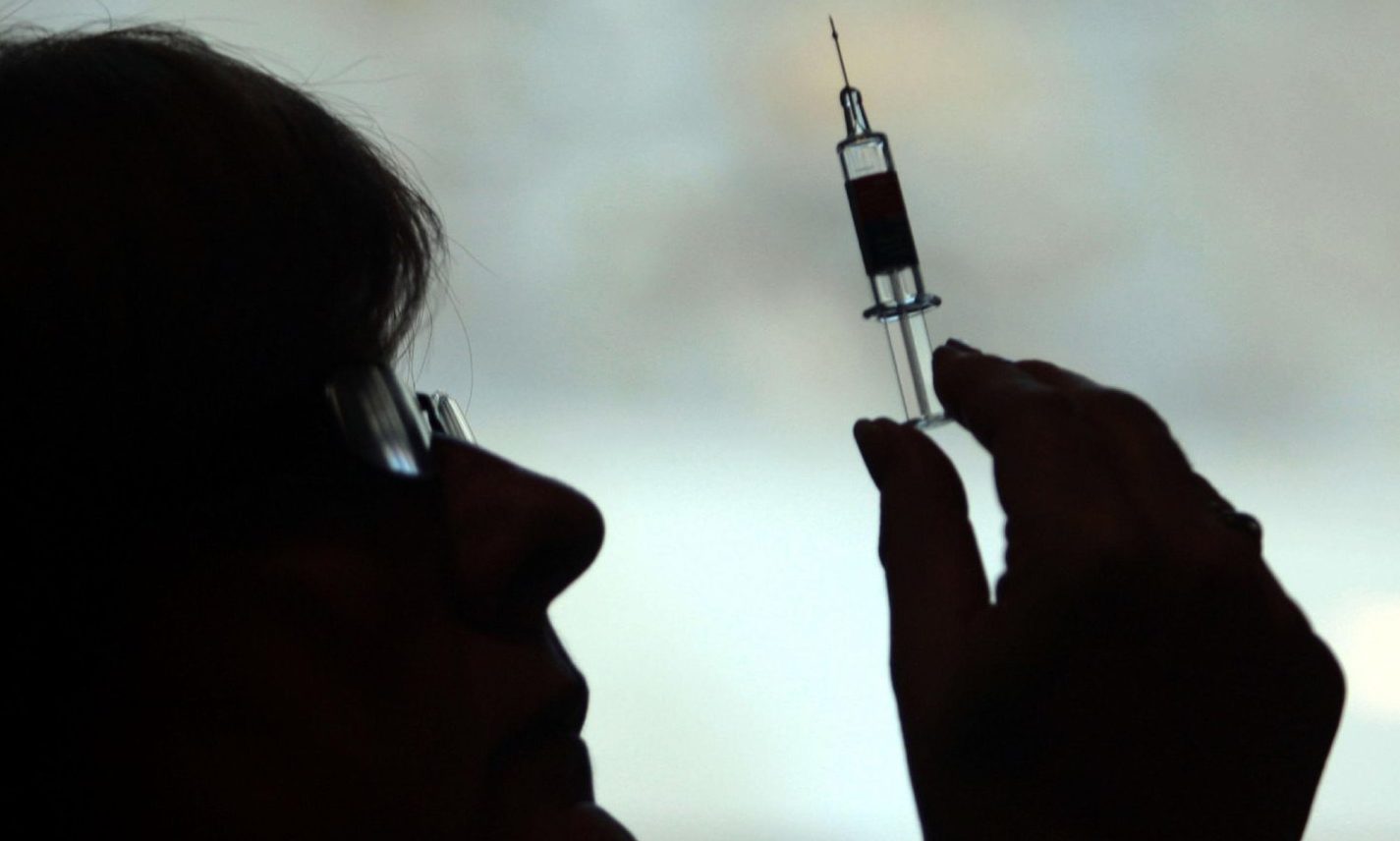Hundreds of vaccinators are being recruited as part of a drive to deliver 50,000 Covid jabs in Grampian every week.
Plans are in place for the further ramping up of the inoculation roll-out, requiring the use of dozens of north-east locations including the P&J Live Arena.
As part of this, 70 whole-time equivalent vaccinators and 280 healthcare support staff are to be hired – in addition to the workforce already leading the charge against coronavirus.
It is thought this will include retired professionals and students, as well as keen helpers with no medical background following a period of training.
Members of the city’s Integrated Joint Board (IJB) – responsible for health and social care – will be given a full briefing on the programme next week, with new meeting papers offering a glimpse at the scale of the scheme.
They say it is “anticipated” that Grampian will be delivering 50,000 vaccine doses per week in February, with all those in the priority groups expected to have been offered their first jab by March 22.
Doses are being given out in three “waves” – firstly covering care home residents and the over-80s, followed by the over-50s, clinically vulnerable and those aged 16-64 deemed at risk.
The remainder of the population – everyone over 16-years-old – will make up wave three.
The most recent figures, compiled on Tuesday, show more than 5% of Aberdeen’s population – almost 12,000 people – has received the first dose.
This includes more than 90% of care home residents and 11% of over-80s.
Across the country, more than 334,000 people have received their initial dose.
Earlier this week NHS Grampian said first vaccinations have now been given to all older care home residents who were fit, able and consenting, with return visits for “catch-up” work already scheduled.
Major recruitment drive
The IJB papers say a “significant” recruitment drive is under way to find helpers willing to administer the vaccines.
But, even if the 350 positions are filled, there will still be a “gap” in provision – with Aberdeen City Health And Social Care Partnership (ACHSCP) making up the numbers in the meantime.
The papers say: “A directive which will enable non-registered staff to administer vaccines under a pandemic protocol is expected to be put in place, but there is not yet confirmation of when this will be.
“Planning assumptions include the use of retired health professionals and students in waves one and two, and potentially other individuals with no healthcare experience in waves two and three.
“The use of non-professionally registered vaccinators will require additional planning particularly in terms of competency assessment, operational orientation and instilling health service quality values.”
Jab plans
As part of the roll-out, the P&J Live arena at The Event Complex Aberdeen (Teca) is being transformed into a mass vaccination clinic.
Once up and running, it is expected to accommodate 20,000 jabs per week. Three-quarters of the capacity will be used to vaccinate Aberdeen residents, with the remaining quarter for those in Aberdeenshire.
While vaccinators have entered the likes of care homes and hospitals to administer the vaccine so far, over-80s who are healthy enough will generally be asked to attend their local GP clinic.
An agreement has been reached with health and social care partnerships to step in for communities where surgeries are not giving inoculations.
All hospital patients over 70 who have not been vaccinated “will now be so,” and preparations have also been made to vaccinate everyone before they are discharged to a care home.
Risk to project
The IJB papers say there are two “significant” risks to the programme – the availability of the vaccine and of workers able to lend a hand.
In terms of inoculation stocks, a set-up has been devised to ensure they can be distributed throughout the north-east as required.
“Currently, vaccine supply fluctuates but it is hoped this will stabilise,” the report says.
“NHS Grampian will rely on a legal argument that the vaccine programme is internal to
the NHS meaning that it is exempt from the requirement to hold a wholesale dealing license.
“And it will therefore be able to move vaccine stocks around the NHS Grampian area as required.”
‘Lessons learned’ after flu jab fiasco
Health chiefs say “lessons have been learned” in time for mass Covid vaccinations, after a challenging flu jab roll-out where systems failed “literally hours” before they were due to begin.
North-east healthcare staff found themselves having to phone patients to cancel inoculations and prevent clinics being “overwhelmed”, while solutions to other problems “arrived too late” to make a significant impact.
Next week’s Aberdeen Integrated Joint Board meeting will hear of some of the obstacles which blocked the 2020/21 flu vaccination programme from running smoothly.
But bosses say they have been able to learn from the situation and are making changes.
Meeting papers lodged by Aberdeen City Health and Social Care Partnership (ACHSCP) say there was “no clear definition of roles and responsibilities” in terms of how NHS bosses wanted the flu jab project to be enacted, adding late changes to start times ate into opportunities to properly organise the system.
Planners had to contend with the impact of coronavirus, staff shortages and a need to vaccinate more people than in previous years, with less time to prepare.
Health chiefs said the flu roll-out had four parts – covering the three area health and social care partnerships and NHS Grampian.
But documents lodged ahead of the meeting say a more centralised approach must be taken in future.
“There was a need to share experience, resource and learning; coordinate activity; and help anticipate and mitigate common risks while also providing a route for the escalation of these,” they say.
Bosses said a project of this nature needed “senior oversight”, adding arrangements did “evolve” over time but “arrived too late and at a time when many issues had already arisen”.
Difficulties were noted regarding patient lists stored by GPs, as they were in varying formats and extra staff had to be hired and trained to sift through them.
And a patient scheduling system broke down “at the last minute” due to technical difficulties – prompting staff to take to the phones, as there was no time to re-send letters in the post.
System breakdown
A manual scheduling programme was then set up but, due to shortages, it was left to just one person in Aberdeen to organise.
In turn, the under-pressure work caused appointment letters to be delayed or not sent at all.
A general NHS Grampian phone line was initially used for people to raise concerns about this, but “quickly” became overwhelmed – as did a dedicated email inbox set up after.
The board papers say: “For Covid vaccinations, each partnership will be responsible for setting up its own call centre.
This gives us a logistical and resourcing headache…”
“While this gives us a logistical and resourcing headache, it at least gives us more control over the training of staff and the specific, relevant, local information they provide.”
They added: “In essence, a lot of activity was reactive, with no time for a full and robust planning approach to be undertaken particularly in relation to contingency planning.
“In even the best planned programmes things go wrong.
“We learned as we went along and certainly have lots of experience to contribute to the governance and planning for Covid vaccinations.”
Flu jab stats
Despite the difficulties, more people have been able to receive their flu jab this winter compared to previous years.
It was announced in August that over-55s, social care workers and household members of people shielding would also qualify for a free vaccination.
Prior to this, it was only given over-65s, young children, pregnant women, health care workers, carers and people with underlying health conditions.
The IJB papers show that uptake for the vaccine by over-65s increased by almost 2%.
As of the latest stats compiled on Tuesday, 72.7% had received it, compared to 70.8% the previous year.
Additionally, 50.6% of those in the “at risk” category took the jab, up from 42.5%.

